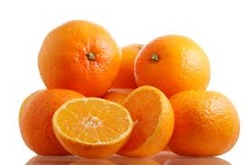
Oranges are coming back into season! Oh, how I’ve missed sweet, juicy oranges! The oranges I’ve been getting over the past several months have been dry and somewhat lacking in flavor. And that includes oranges from my local farmer’s market. Probably because with the exception of Valencia oranges, most other oranges are not in season over the summer months. I bought a 10-pound bag of oranges today from my local farmer’s market today, and they are the sweetest, juiciest, most flavorful oranges I’ve had in a long time!
For under 70 calories, a medium-size orange has a full day’s supply of vitamin C and about 1/3 the calcium of a glass of milk. Plus it’s loaded with fiber and has lots of other vitamins, minerals, and phytonutrients, including vitamin A, folate, thiamin, and potassium.
The soluble fiber in oranges absorb water and form a gel-like substance that moves slowly through your intestinal tract, slowing down absorption of the sugars from the orange, a benefit you don’t get when you drink orange juice. The slow-moving gel lowers cholesterol by picking up and eliminating cholesterol as it moves through and out of your system.
Vitamin C is an antioxidant, which helps protect cells from oxidative damage caused by free radicals (to learn more about free radicals, see my post “What You May Not Have Known About Free Radicals” from July 25, 2013). Antioxidants such as vitamin C lower the risk of chronic degenerative diseases such as cancer and heart disease by neutralizing free radicals.
Potassium is an electrolyte that helps maintain normal heart function as well as fluid levels in and around cells. Vitamin A contains a group of compounds called carotenoids, which in addition to giving oranges their orange color, also protect your eyes and help you maintain good vision. Folate, needed for proper functioning of the brain, contributes to a healthy heart and has been shown to slow the effects of aging. Thiamine aids in proper functioning of the digestive tract and promotes the health of the liver, eyes, nervous system, mouth, skin, and hair. Plus thiamine, known as the anti-stress vitamin, helps the body withstand stress.
And, don’t forget the sunshine! I know I can’t wait to bite into my next sweet, juicy orange!
For under 70 calories, a medium-size orange has a full day’s supply of vitamin C and about 1/3 the calcium of a glass of milk. Plus it’s loaded with fiber and has lots of other vitamins, minerals, and phytonutrients, including vitamin A, folate, thiamin, and potassium.
The soluble fiber in oranges absorb water and form a gel-like substance that moves slowly through your intestinal tract, slowing down absorption of the sugars from the orange, a benefit you don’t get when you drink orange juice. The slow-moving gel lowers cholesterol by picking up and eliminating cholesterol as it moves through and out of your system.
Vitamin C is an antioxidant, which helps protect cells from oxidative damage caused by free radicals (to learn more about free radicals, see my post “What You May Not Have Known About Free Radicals” from July 25, 2013). Antioxidants such as vitamin C lower the risk of chronic degenerative diseases such as cancer and heart disease by neutralizing free radicals.
Potassium is an electrolyte that helps maintain normal heart function as well as fluid levels in and around cells. Vitamin A contains a group of compounds called carotenoids, which in addition to giving oranges their orange color, also protect your eyes and help you maintain good vision. Folate, needed for proper functioning of the brain, contributes to a healthy heart and has been shown to slow the effects of aging. Thiamine aids in proper functioning of the digestive tract and promotes the health of the liver, eyes, nervous system, mouth, skin, and hair. Plus thiamine, known as the anti-stress vitamin, helps the body withstand stress.
And, don’t forget the sunshine! I know I can’t wait to bite into my next sweet, juicy orange!



 RSS Feed
RSS Feed